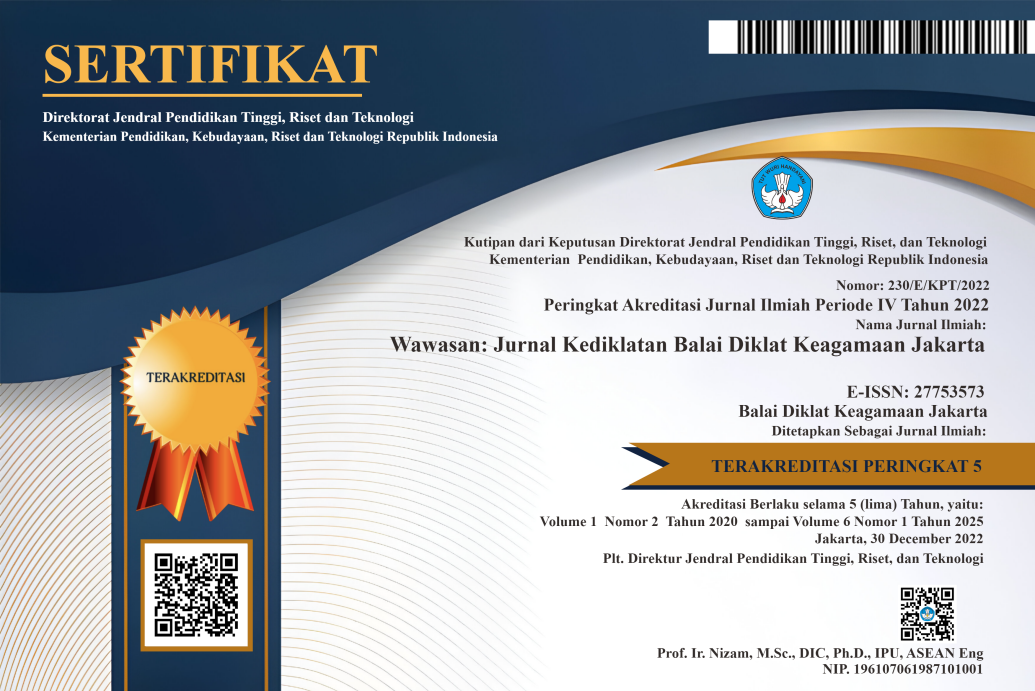NILAI PENDIDIKAN PROFETIK DALAM TRADISI SEDEKAH SUKA-RELA PADA RITUS KEMATIAN MASYARAKAT DUSUN NUGUK KABUPATEN MELAWI KALIMANTAN BARAT
DOI:
https://doi.org/10.53800/wawasan.v5i1.292Keywords:
pendidikan profetik, tradisi kematian, sedekah suka-rela, Dusun NugukAbstract
Abstract
This study is motivated by the lack of studies on the death tradition in the Nuguk Hamlet community, Melawi Regency, West Kalimantan. Therefore, researchers will conduct further studies. This research focuses on the values of humanization, liberation, and transcendence in the tradition of voluntary almsgiving in the Nuguk hamlet community. The type of this research is field research with a case study model, namely a case study of Nuguk hamlet, Melawi district, West Kalimantan. They use descriptive analysis methods and map prophetic educational values introduced by Kuntowojoyo, focusing on three main aspects: humanization, liberation, and transcendence. The object studied is voluntary alms in the death rites of the people of Nuguk Hamlet, Melawi Regency. The conclusion of this article explains that First, the humanization aspect is that the habit of voluntary almsgiving in the death rites of the Nuguk hamlet community is a form of concern between fellow communities so that it can strengthen the community's ties of togetherness and friendship. Second, in the aspect of liberation, voluntary alms assistance in death rites can at least minimize negative things in society, such as social jealousy, envy, and other harmful things. Third, the aspect of transcendence, in the normative-theological claim of religion, is that all worship performed sincerely will receive rewards from God. Likewise, in the habit of voluntary charity, there is hope of receiving a reward from Allah for the good things done.
Abstrak
Studi ini dilatarbelakangi minimnya kajian tentang tradisi kematian pada masyarakat Dusun Nuguk kabupaten Melawi Kalimantan Barat, apalagi dikaitkan dengan pendekatan-pendekatan tertentu. Oleh karena itu, peneliti akan melakukan studi lebih jauh. Fokus penelitian ini adalah bagaimana nilai-nilai humanisasi, liberasi dan transendensi dalam tradisi Sedekah Suka-Rela pada masyarakat dusun Nuguk. Jenis penelitian ini adalah penelitian lapangan dengan model studi kasus, yakni studi kasus dusun Nuguk kabupaten Melawi, Kalimantan Barat. Menggunakan metode deskriptif analisis, serta menggunakan pemetaan nilai-nilai pendidikan profetik yang digagas oleh Kuntowojoyo, yakni fokus pada tiga aspek utama: humanisasi, liberasi dan transendensi. Objek yang dikaji adalah sedekah suka-rela dalam ritus kematian masyarakat Dusun Nuguk, Kabupaten Melawi. Kesimpulan artikel ini menjelaskan bahwa: Pertama, aspek humanisasi bahwa kebiasaan sedekah suka-rela dalam ritus kematian masyarakat dusun Nuguk merupakan bentuk kepedulian antar sesama masyarakat, sehingga dapat mempererat jalinan kebersamaan dan silaturahmi warga. Kedua, aspek liberasi, bantuan sedekah suka-rela dalam ritus kematian setidaknya dapat meminimalisasi hal-hal negatif di kalangan masyarakat, misalnya kecemburuan sosial, sifat iri, dengki dan hal negatif lainnya. Ketiga, aspek transendensi, dalam klaim normatif-teologis agama, bahwa semua ibadah yang dilakukan dengan ikhlas akan mendapatkan ganjaran pahala dari Tuhan. Demikian juga pada kebiasaan sedekah suka-rela, bahwa ada harapan mendapatkan ganjaran pahala dari Allah atas kebaikan yang dilakukan tersebut.
Downloads
References
Alfred. (2018). Hubungan Sains dan Agama Perspektif Kuntowijoyo. Al-Aqidah, 10(2), 10–27.
Anisa, R., Soraya, S. Z., & Nurdahlia, D. U. (2021). Konsep Ilmu Sosial Profetik Kuntowijoyo Terhadap Pengembangan Pendidikan Islam. Kuttab: Ilmu Pendidikan Islam, 05(02), 93–99.
Armet, dkk. (2022). Element Prophetic in the Novel Kubah By Ahmad Tohari. Magistra Andalusia, 4(1), 9–16.
Iin Parningsih. (2021). Eksplorasi Tradisi Mattampung Masyarakat Bugis dalam Kajian Living Qur’an: Studi Desa Barugae Kabupaten Bone Sulawesi Selatan. Pappasang, 3(2), 64–84.
Kuntowijoyo. (2019). Maklumat Sastra Profetik. DIVA Press.
Mahdi, M. (2019). The Death Tradition of Malay Communities of Sungai Raya Dalam Vilage, West Kalimantan. Khatulistiwa, 8(2), 5. https://doi.org/10.24260/khatulistiwa.v8i1.1205
Manan, A., & Arifin, M. (2019). Cultural Traditions in Death Rituals Within the Community of Pidie, Aceh, Indonesia. MIQOT: Jurnal Ilmu-Ilmu Keislaman, 43(1), 130. https://doi.org/10.30821/miqot.v43i1.670
Muammar, A., Marhaban, Miswari, M., & Nasution, I. F. A. (2021). Kuntowijoyo’s Social Prophetics and The Theological Paradigms in Islam. Al-Ulum, 21(2), 362–387. https://doi.org/10.30603/au.v21i2.2274
Mufidah, M. (2022). Javanese Islamic Tradition of Death. Warisan: Journal of History and Cultural Heritage, 3(2), 58–64. https://doi.org/10.34007/warisan.v3i2.1519
Nanang Martono. (2011). Metode Penelitian Kuantitatif. Rajawali.
Nasar Lundeto;Syamsun Ni‟am. (2022). Paradigma Islam Profetik (Melacak Nilai-Nilai Moderasi Beragama Dalam Pemikiran Kuntowijoyo). Farabi, 19(02), 106–131.
Parwanto, W. (2015). Kajian Living Al-Hadits atas Tradisi Shalat Berjamaah Mahgrib-Isya` Di Rumah Duka 7 Hari. Al-Hikmah, 13(2), 51–64.
Parwanto, W. (2019). KONTESTASI ANTARA TEKS DAN REALITAS SOSIAL : SAKRALITAS ‘ AMIL ZAKAT DI DUSUN NUGUK , KABUPATEN MELAWI. Fikri : Jurnal Kajian Agama , Sosial Dan Budaya, 4(1).
Parwanto, W., & Busyra, S. (2023). Reading Tradition in Informative and Symbolic Theory : The Case of Robo-Robo Tradition in Nuguk Hamlet , Melawi District , West Kalimantan. Kawalu: Journal of Local Culture, 10(2), 29–50.
Parwanto, W., Sahri, S., Busyra, S., Riyani, R., & Nadhiya, S. (2022). Religious Harmonization on Ethno-Religious Communities of Muslim and Dayak Katab-Kebahan in Tebing Karangan Village, Melawi District, West Kalimantan. Harmoni, 21(2), 184–200. https://doi.org/10.32488/harmoni.v21i2.638
Pemerintahan Desa Tb. Karangan. (2022). Mading Desa. Pemerintahan Desa.
Ramdhan, M. (2021). Metode Penelitian. Cipta Media Nusantara.
Ririn, O. S., Darmawan, D. R., & Efriani, E. (2021). Tampir sebagai Ritual Peralihan dalam Upacara Kematian pada Suku Dayak Taman Kapuas di Kalimantan Barat. Ideas: Jurnal Pendidikan, Sosial, Dan Budaya, 7(4), 183. https://doi.org/10.32884/ideas.v7i4.503
Sabeilai, Wilda Veronica, Isjoni, T. (2019). Andung Tradition in Death Ceremony Saur Matua Batak Toba in Palas Society Urban Village Pekanbaru. JOM, 6(2), 1–11.
Sagir, A., & Hasan, M. (2021). The Tradition Of Yasinan In Indonesia. Khazanah: Jurnal Studi Islam Dan Humaniora, 19(2), 203–222. https://doi.org/10.18592/khazanah.v19i2.4991
Saputra, K. D. (2020). Memasyarakatkan Kesalehan (Dimensi Tasawuf dalam Etika Sosial Profetik Kuntowijoyo). ABHATS: Jurnal Islam Ulil Albab, 1(2), 317–325.
Seise, C. (2021). Dying a Good Death: Indonesian Rituals and Negotiations About the End of Life. International Journal of Islam in Asia, 1(2), 168–190. https://doi.org/10.1163/25899996-bja10014
Sihombing, L. H. (2022). Rituals and Myths at the Death Ceremony of the Toraja People: Studies on the Rambu Solo Ceremony. Satwika : Kajian Ilmu Budaya Dan Perubahan Sosial, 6(2), 351–365. https://doi.org/10.22219/satwika.v6i2.22785
Sugiyono. (2017). Metode Penelitian Kualitatif, Kuantitatif dan R&D. Alfabeta.
Tim Desa. (2012). Buku Pedoman Desa Tebing Karangan. Desa Tebing Karangan.

Published
Issue
Section
License
Copyright (c) 2024 Wawasan: Jurnal Kediklatan Balai Diklat Keagamaan Jakarta

This work is licensed under a Creative Commons Attribution-ShareAlike 4.0 International License.

















